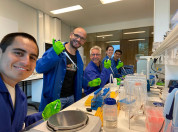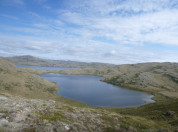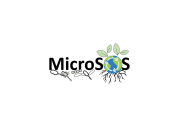Search
Filter by
Type
Tags
Dossiers
Themes
Departments
Active filters
1032 search results
Search results
-
Jos Raaijmakers made it again to the “Highly Cited Researchers” list
Clarivate publishes an annual list of the top 1% most cited researchers worldwide. For the eighth year in a row, NIOO researcher Jos Raaijmakers is included.
-
CLIMET
CLIMET is an NWO ENW-XL funded consortium comprised of researchers from the Netherlands Institute of Ecology (NIOO-KNAW), Utrecht University, and Radboud University.Our team of microbiologists, ecologists, and paleogeologists will map the impact of organic carbon and lanthanides on the Arctic methane cycle, from the genes involved in microbial metabolism to the impact on methane emissions from Greenland’s lakes.
-
Pieter Jense
Concierge
-
Jiayi Jing
PhD Candidate -
MicroSOS
MicroSOS aims to establish a collaborative platform bridging academic and non-academic sectors in agriculture and facilitating knowledge exchange between researchers and industry professionals. The project focuses on enhancing agricultural resilience to climate change through microbiome-based approaches. This project is part of Staff Exchanges funded by the European Union’s Horizon Europe programme under the Marie Skłodowska-Curie Actions.
-
SEFAP: SMART experimental facilities for aquatic processes
This project will provide an upgrade of four major experimental mesocosm facilities that are key national assets for aquatic ecology in the Netherlands. The existing mesocosm facilities based at NIOO-KNAW, University of Leiden, Radboud University and Wageningen University and Research have arisen from several decades of research and development, target different aspects of aquatic ecosystems, and have a proven track record of delivering internationally excellent aquatic research. -
Camille Delavaux
Senior Researcher
-
IT administrator (vacancy in Dutch)
Ben jij een servicegerichte systeembeheerder met een passie voor innovatie die ook een gebruiker kan ondersteunen? Wil jij werken in een inspirerende wetenschappelijke omgeving waar je bijdraagt aan baanbrekend ecologisch onderzoek? Dan zijn wij op zoek naar jou! -
Ayke Haller
Researcher
-
PhD thesis defence Han Wang: Microbial engineering of soil structure
On Monday 10 November 2025, Han Wang will defend her thesis, titled "Microbial engineering of soil structure: Insights from synthetic Mars simulant soils".
